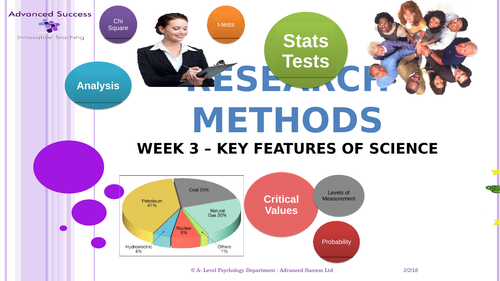

NEED a Lesson? Save yourself HOURS and HOURS of planning and preparation time.
This PowerPoint fully supports our popular Research Methods Section of our Popular Student Workbooks and covers the following::
Week 3 Key Features of Science
Learning Objectives
On completion of this section you should be familiar with the following:
Lesson 1. Key features of science: objectivity and the empirical method; replicability and falsifiability; theory construction and hypothesis testing; paradigms and paradigm shifts.
Lesson 2. Types of validity across all methods of investigation: face validity, concurrent validity, ecological validity and temporal validity. Assessment of validity. Improving validity.
Lesson 3. Reliability across all methods of investigation. Ways of assessing reliability: test-retest and inter-observer; improving reliability.
Lesson 4. Reporting psychological investigations. Sections of a scientific report: abstract, introduction, method, results, discussion and referencing.
Lesson 5. Sampling Methods: the difference between population and sample Sampling techniques including: random, systematic, stratified, opportunity and volunteer; implications of sampling techniques, including bias and generalisation.
FOR FURTHER SUPPORT CHECK OUT - This Lesson on our Twitter Moments https://twitter.com/i/moments/956450738196148224
This PowerPoint fully supports our popular Research Methods Section of our Popular Student Workbooks and covers the following::
Week 3 Key Features of Science
Learning Objectives
On completion of this section you should be familiar with the following:
Lesson 1. Key features of science: objectivity and the empirical method; replicability and falsifiability; theory construction and hypothesis testing; paradigms and paradigm shifts.
Lesson 2. Types of validity across all methods of investigation: face validity, concurrent validity, ecological validity and temporal validity. Assessment of validity. Improving validity.
Lesson 3. Reliability across all methods of investigation. Ways of assessing reliability: test-retest and inter-observer; improving reliability.
Lesson 4. Reporting psychological investigations. Sections of a scientific report: abstract, introduction, method, results, discussion and referencing.
Lesson 5. Sampling Methods: the difference between population and sample Sampling techniques including: random, systematic, stratified, opportunity and volunteer; implications of sampling techniques, including bias and generalisation.
FOR FURTHER SUPPORT CHECK OUT - This Lesson on our Twitter Moments https://twitter.com/i/moments/956450738196148224
Get this resource as part of a bundle and save up to 39%
A bundle is a package of resources grouped together to teach a particular topic, or a series of lessons, in one place.
Something went wrong, please try again later.
This resource hasn't been reviewed yet
To ensure quality for our reviews, only customers who have purchased this resource can review it
Report this resourceto let us know if it violates our terms and conditions.
Our customer service team will review your report and will be in touch.
£5.00